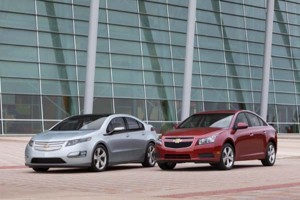
Two high-mileage vehicles, the Chevrolet Volt and the Chevrolet Cruze at half the price.
Forty percent of consumers report they are likely to test drive an electric vehicle, according to a new study of U.S. adults. However, overall awareness of EVs remains low. Even those who follow EV developments and news reports remain concerned about batteries – the Achilles heel of what remain very expensive vehicles.
“For a new product category, interest in electric vehicles is strong and likely to grow as more vehicles enter the market and consumers become more aware of them,” said Chris Ely, manager of industry analysis, for the Consumer Electronics Association, the publisher of the study.
“Manufacturers, dealers and other sellers will need to emphasize mileage and battery-related specifications when promoting and selling electric vehicles,” Ely concluded.
This should come as no surprise to people knowledgeable about the ongoing efforts of automakers to reduce the cost of battery packs, which can range from $10,000 to $20,000 per EV – or the price of a new gasoline-powered economy car from the same makers such as Chevrolet and Nissan, arguably the two companies most committed to popularizing EVs.
The study, Electric Vehicles: The Future of Driving, affirms that electric vehicles tempt consumers with improved environmental quality and potential cost savings, but serious questions remain about battery life and convenience of battery charging.
Consumers are open to considering an electric vehicle in the future, with 42% reporting they are likely to follow news reports about electric vehicles. However, overall awareness of the various types of alternative vehicles remains low. While nearly one-third report they are familiar, or very familiar, with hybrid vehicles, only about one-quarter are familiar with electric-powered vehicles.
Those consumers who are open to buying an electric vehicle cite the positive environmental impact and potential cost savings as primary reasons to do so. More than three-quarters of those surveyed (78%) said the vehicle’s ability to run without gasoline is the greatest advantage, followed by less pollution (67%), and the lack of need for oil changes and tune-ups (60%).
According to the study, consumers perceive several disadvantages about electric vehicles. Concerns about mileage potential before needing to recharge (50%) and battery life (34%) top the list. Cost of the vehicle, reliability and availability of charging stations are also key concerns.
The study finds running out of battery power on the road (71%), lack of charging stations and/or not being able to recharge (66%) and limited mileage (59%) are the most common perceived disadvantages with electric vehicles. Home charging stations may also impact purchase decisions. Half of consumers (51%) would be less likely to consider purchasing an electric vehicle if they would have to install special charging equipment for the batteries.
“Environmental benefits, coupled with potential cost savings in fuel and tune-ups, will lead to increased interest for electric vehicles and potential floor traffic at dealerships,” said Ely. “But concerns regarding battery life, charging stations and limited mileage may keep some consumers away until a comprehensive infrastructure is in place.”
Electric Vehicles: The Future of Driving (August 2010) was conducted online from May 27 – June 3, 2010. It was designed and formulated by CEA Market Research, which tracks sales data and historical trends for the consumer electronics industry.
For the first time, electric vehicles will be at the 2011 International CES, showcasing a full range of high- and low- speed vehicles, energy storage devices and charging equipment. This new CES TechZone will feature major automotive companies, including Audi, in the Las Vegas Convention Center’s North Hall.
